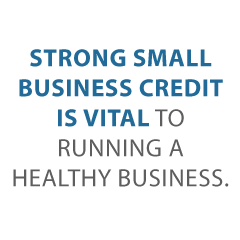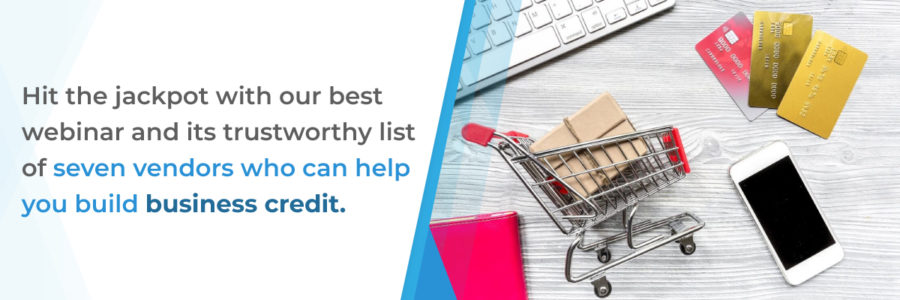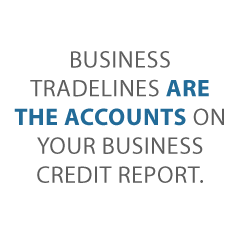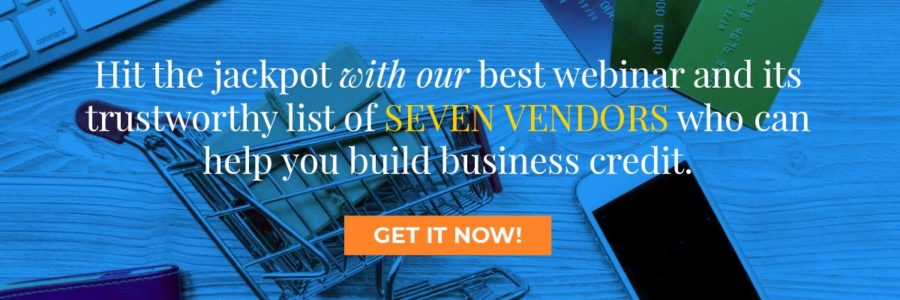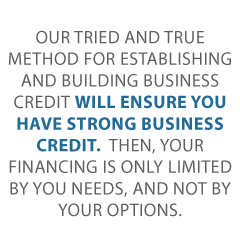
Top 5 Things You Didn’t Know About Small Business Credit
There is so much about small business credit that is misunderstood. Many entrepreneurs do not even realize their company can have its own credit. Those that do realize it, often have a very skewed idea about how it works. Because we are so familiar with personal credit, we tend to assume business credit works the same way. While some aspects of the two are similar, there are some very important differences that most entrepreneurs do not know.
Everything You Don’t Know that You Don’t Know About Small Business Credit
Some of the most common misconceptions about business credit are related to how you get it. Even more are about what affects business credit and where the information on the report comes from. It is such uncharted territory that most do not even know what they don’t know.
Once you understand all the differences between business credit and personal credit, you can begin the work of building a solid company foundation for your biz.
5 Things You Didn’t Know About Small Business Credit
Here are a few of the most common misconceptions about business credit.
You Have to Work for Small Business Credit
It doesn’t build on its own through the course of regular company financial transactions. This is different than how personal credit builds. With personal credit, your payment information is simply reported to the personal credit reporting agencies (CRAs.) With business credit, it isn’t so simple.
It takes intentional effort from the way you set up your biz to the accounts you apply for first. You have to go into it with the intention of building business credit. You have to work for it.
Check out our best webinar with its trustworthy list of seven vendors to help you build business credit.
It’s About More than Payment History
Unless your company is set up with the intention of separating it from the owner, business transactions will report to the personal CRAs. This means your corporate transactions and your personal transactions will be reporting on your personal credit. Everything will be all mixed up.
Not only that, but if you do not set things up properly, you could end up not having a business credit score at all! Even if you have credit in your company name, if your firm is not properly set up as a fundable entity, those accounts will be on your personal credit report. You may not even have a business credit report!
Your Personal credit CAN affect it
By nature, the way a company must be set up to build business credit means that your company’s accounts will not affect your personal credit. That is, if everything is set up properly. However, the reverse is not necessarily true. When lenders look at your credit, not only might they pull a personal credit report, but they can use other sources as well. The information gleaned from those sources, even if not firm-related, can affect their decisions.
You are probably asking yourself the question then, why even bother? If your personal credit can still come into play, what’s the point? There are a few reasons biz credit is important. First, it protects your personal credit. Like I said before, if your set up your company properly, your operational finances should not affect your personal credit score. This will ensure that if your biz suffers, your personal finances can still stay intact.
In addition, if personal issues are coming into play when you are trying to get company funding, strong business credit can help. It can mitigate negative personal information lenders may consider in their decision making.
Finally, if you do not have business credit, you will have to fund your dream on your personal credit alone. Personal limits are typically much lower than business credit limits. Conversely, company credit expenses tend to be much higher than personal expenses. This means that even if you are paying off your expenses each month, you are likely to hover near your limits consistently.
That will increase your debt-to-credit ratio, which will in turn lower your personal credit score. So even if you do everything right, you could end up damaging your personal credit if you try to use it to fund your company.
The Information Comes from Places You May Not Expect
Like I said, it’s not all just payment history. There are so many other things the CRAs look at and can report on. They gather information from a number of sources, and not all of them are lenders. For example, the Small Business Finance Exchange, or SBFE, gathers information from a variety of places. These include, among other things, public records. That means every lien, every parking ticket, and every bounced check has the potential to bite you.
You do NOT Have to Have Business Credit to GET It
This is perhaps the most difficult thing for some entrepreneurs to understand. It can seem at the onset that you have to have business credit to get business credit. An entrepreneur is often shocked when they try to apply for funding with biz credit and they are denied, because they pay their bills on time. They cannot figure out what is going on.
They then find out they actually do not have business credit. That is why they are continually denied when they apply for corporate credit cards. Then they wonder how on earth they are supposed to get business credit if they are denied funding because they do not have company credit.
Here is the thing. Once you have your company set up properly as a separate, fundable entity, you need to start working with starter vendors. These are vendors that will extend net terms on invoices without a credit check. Not only that, but they will also report your payments on these invoices to the CRAs. This will be the beginning of your business credit score. You do not have to have business credit to get corporate credit, but you do have to start with starter vendors.
Check out our best webinar with its trustworthy list of seven vendors to help you build business credit.
Now That You Know
Now that you know this information, you probably have a ton of questions. Questions like:
- How do I make my company a fundable entity separate from myself?
- What’s the next step after starter vendors?
- Where are lenders getting information about me?
- How do I know what is on my credit report?
We can answer these questions and more. The first step is already done. Now you know what you didn’t know before.
How to Separate Your Company as a Fundable Entity
This part is easiest taken care of on the front end. However, it’s never too late. If you are looking for funding, you likely already have an established biz. You can take these steps now to begin building your corporation credit.
How to Separate a Company from Its Owner to Build Small Business Credit
- Establish a separate phone number and address for the biz.
- Formally incorporate as an LLC, S-corp, or Corporation.
- Establish a separate company bank account.
- Have a professional corporate website.
- Have a separate corporation email address with the same URL as the website.
- Get and EIN and use it instead of your SSN to apply for business credit.
- Get a D-U-N-S number.
A few things to remember when it comes to these things are that you can get a virtual physical firm address pretty easily. Also, there are several ways to get a corporate phone number online that will simply forward to the phone number you already use. This means there is no need to get a separate phone.
Also, do not use a free hosting service. You need to pay for hosting. The same goes for email service. A free service such as Hotmail, Yahoo, or even Gmail will not work in this situation.
As for a D-U-N-S number, be careful. You really do need it because you cannot have a credit file with Dun & Bradstreet without it. Since they are the largest and most commonly used biz credit reporting agency, having a D-U-N-S number is a must. However, when you go to their website to get one, they will try to upsell you. The number is free, and you do not need anything else. Stay strong.
How to Use Starter Vendors to Build a Small Business Credit Score
Now, you know how to set up your company and you know you need to start with starter vendors, but where do you go from there? The business credit building process works in tiers. You start with the vendor credit tier, which is where the starter vendors are. Then, once you have 8 or 10 of those vendors reporting your positive payment history, you can move on to the retail tier.
The retail credit tier is where you find credit cards that can only be used at the retail stores that issue them. For example, an Office Depot credit card would be in this tier. After you have enough of these types of cards reporting your payment history to the CRAs, you can move on. Your small business credit should then be strong enough to apply for cards in the fleet tier.
The fleet credit tier is where you find the cards that you use specifically for fuel and auto repair and maintenance costs. These are cards from companies such as Shell and Fuelman. After you snag enough of these and have them reporting positive payment history, you can apply for cards in the top tier.
That is the cash credit tier. These are the cards that have higher limits, lower rates, and no exclusions on where you can use them or what you can use them for. If you use these cards responsibly, you will have access to all the funding you need to run and grow your business.
Small Business Credit and Company Loans
As you may have noticed, we didn’t mention biz loans much when talking about small business credit. That is because most traditional lenders are going to check your personal credit history even if you do have strong corporate credit. There is just no way around it. However, if you have strong company credit, it can only help you. It may mean the difference in approval for a $50,000 loan or a $100,000 loan, or 10% interest and 6% interest.
In addition, some non-traditional lenders will actually look at business credit and even report to the business CRAs such as Dun & Bradstreet, Experian, and Equifax.
Check out our best webinar with its trustworthy list of seven vendors to help you build business credit.
Monitor Your Credit
This is important all the way through the process. First, you need to know which accounts are reporting to your small business credit. You also need to know how many. That’s how you will know it is time to start applying for cards in the next tier.
The problem is, you cannot get a free copy of your business credit report the same way you can with personal credit. You can purchase a copy of your report from the reporting agencies, but you have to pay each time you want to see what is on your report. At CreditSuite.com/monitoring, we can help you monitor your business credit on an ongoing basis for a fraction of the price. Not only will this help you to know when to move on to the next tier, but it will let you see if there are any mistakes or inaccuracies keeping your score from being the best it can be. If there is something there that shouldn’t be, or something not there that should be, you can get it corrected quickly.
Everything You Need to Know About Small Business Credit and Then Some
Now that you understand more about small business credit, what it is, and why you need it, you are likely to have more questions than just what we’ve covered. Here is one thing you can know without a doubt however. Strong small business credit it vital to running a healthy company. Our free guides, webinars, and dedicated staff are here to help you build and maintain small business credit every step of the way. Your business success and growth depend on it.
The post Top 5 Things You Didn’t Know About Small Business Credit appeared first on Credit Suite.

